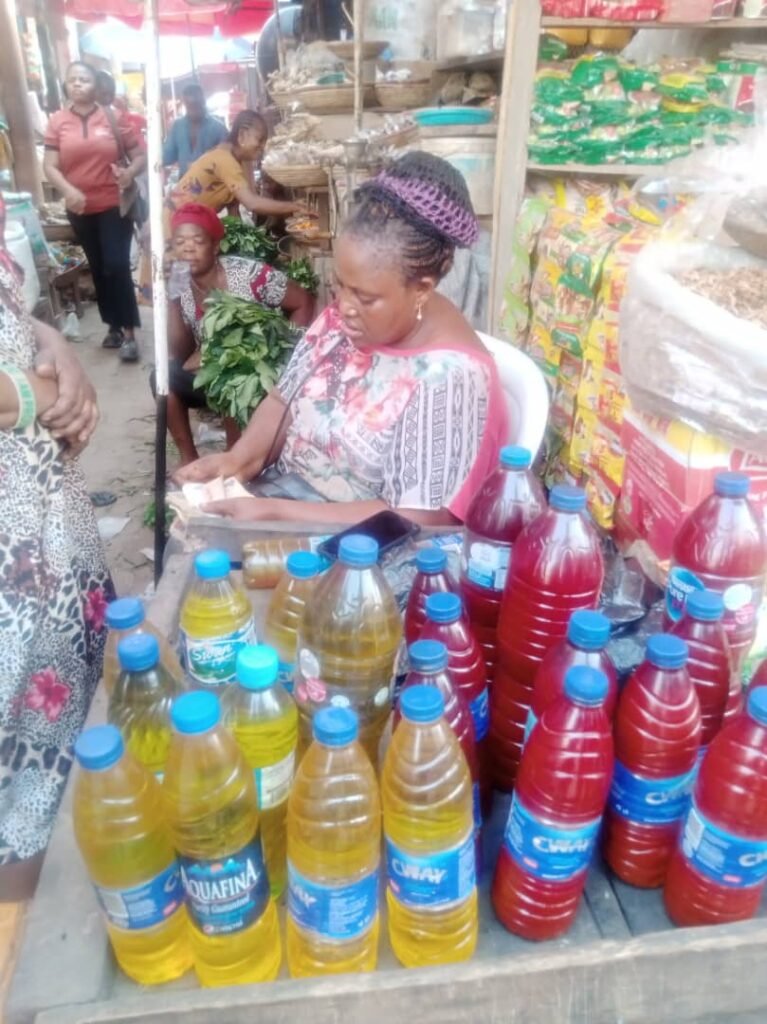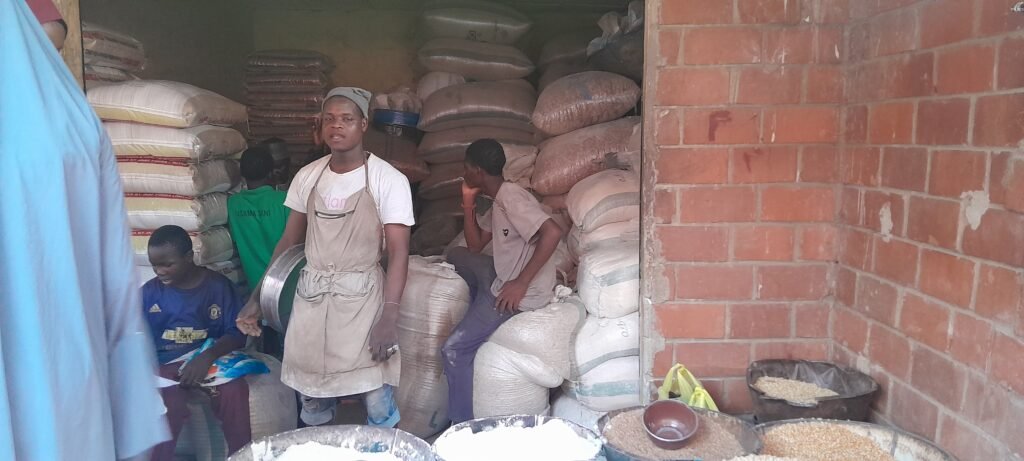Beep beep e-e-e-e. It is 2:45 pm, the sun beats mercilessly this bustling Monday in Dutse-Alhaji Market, a thickly populated area of Abuja, Nigeria’s capital territory. The atmosphere is pouring out harsh shadows across the dusty ground and the sound of horns from tricycles, known as Keke nape, rents the air as they meander through the narrow pathways at the entrance of the market, vying for passengers in a bid to eke out a living. The area is mostly inhabited by low-class residents. They start their day in the early morning and close late in the night. Here, a typical day is characterized by chaos, uncertainty, a babel of shrill voices, and, many a times, confusion. Nigerians, irrespective of their diverse ethnicity, religion cooperate to do business and make a living here to survive the current economic hardship. The market is outstanding for cheap prices of food items.
Gom Mirian, who visited the market, observed that among other things, the market now attracts middle and high-class residents from neighbouring areas like Gwarinpa and Matima due to the high cost of living. As hunger bites harder occasioned by the high inflation rate and increasing food prices, the market has provided a relief of sorts, in terms of low prices.
High Inflation
Nigeria is currently facing its highest rate of inflation in years, with the cost of living hitting an unprecedented high of approximately 35%. This has had a profound impact on the lives of everyday Nigerians, many of whom are struggling to make ends meet as the cost of necessities continues to rise.
Musa Hustling with Keke
Musa, a keke napep driver, shared his struggles, saying, “It’s tough out here. The cost of living keeps going up, but our earnings remain the same. We have to work twice as hard to make ends meet.”

Musa’s sentiments were echoed by his fellow drivers, each of whom shared tales of financial strain and uncertainty. It was clear that the economic hardship had taken its toll on these hardworking individuals, but amidst the adversity, they displayed a resilience that was nothing short of inspiring.
A Trader’s Resilience
Similarly, our correspondent approached a group of market traders, eager to hear their perspectives on the current state of affairs. Among them was Mrs. Ibeh Chinyere, a palm oil seller and a mother of four with a warm smile and a steely resolve. She spoke of the impact of inflation on the cost of food items and how it had affected her livelihood.
“The prices keep going up, but our customers can only afford so much,” Mrs. Chinyere lamented. “Sales now we are not talking of profit anymore but for daily survival.
“Before Tinubu’s government at least when you sell five gallons of oil a day you would be able to buy food and still save some profit but now things have changed, with the current prices of foodstuff you must be able to sell up to 15 gallons a day before you can see small money to buy food for children.”

“The prices keep going up, but our customers can only afford so much. We have to find ways to adapt, to make do with what we have. It’s not easy, but we have no choice. She continued. “Tinubu should take fuel price back to where Goodluck and Buhari left it and every price of goods will come down.”
Buyer’s Lamentation
Africa Health Report, AHR encountered a young man, Ushahemba, who was lamenting aloud while shopping for foodstuffs. He spoke candidly about the challenges he faced in managing his household expenses in the wake of the soaring inflation rate.
“It’s a constant struggle to make our budget stretch,” Ushahemba said, his brow furrowed with concern. “Just see rice wey I just bought two modus for N4,400, Na money wey you go take a half bag of rice before e no even reach like that before. A bag of rice was going for N7,500 to N8000 naira before that was how Goodluck left it. Buhari came and spoiled it, e carri us enter grass, now Tinubu come dey carry us enter forest.
“It’s a constant struggle to make our budget stretch. This has taken a serious toll on people like me who work on-site. We must eat, but job no dey again because most people are no longer building houses due to the high cost of cement.”
Dry Fish Seller
Also, Ifeanyi, a dry fish seller lamented no sales and said: “Fish is too expensive now how many people can afford it? A carton of fish sold for N35,000 before this government is now sold for N100,00 thousand plus and we are selling one medium size of fish now for N1000 to recover our cost People are no longer buying fish again they prefer to buy food to survive and forgo fish., we are not selling.”
Grain Seller
Sani Abdullahi, a grain seller, expressed concerns about the significant rise in prices.
He attributed this increase to various factors, including bandit activities and the fear experienced by farmers.
According to him, the prices of goods used to remain stable over a given period, but now the prices fluctuate rapidly, sometimes even changing within hours or seconds.
“For instance, from Saturday to today (Monday), the prices of rice and beans have increased by N5000 to N10,000. Abdullahi cited an example where he bought a bag of rice called “Big Bull” for N64,000 on Saturday, but today it is being sold at N70,000.
Beans Price Jumps
“Similarly, the price of beans has jumped from N130,000 to N140,000.”
He mentioned that he had to sell a model of beans for N1,700 because of the soaring prices. Adding that the cost of groundnut has risen from N70,000 to N150,000.
Abdullahi expressed concern about the exorbitant prices, stating that this situation is not conducive to business growth.
He questioned the capability of the government, which has not even completed a year, to handle this issue should it persist.
Abdullahi confessed his confusion about the cause of these price hikes, particularly since the rice and beans he sells are locally produced, not imported.
“I wonder why there is a constant increase in prices of local rice and beans when it is not linked to the value of the dollar.

“This rise in prices is negatively impacting our sales, as customers, who used to buy significant quantities, can now only afford two to three modus of rice. Some customers can only buy half or a quarter of a bag of goods, while others can only afford a cup of rice. However, people are still purchasing these products due to their hunger.”
Escalating Insecurity Scaring Farmers
In addition to the rising prices, Abdullahi also highlighted the issue of bandits hindering farmers from harvesting their crops.
He mentioned that bandits would sometimes claim ownership of farmland, demanding extortionate amounts ranging from N5 to N10 million from farmers as payment to allow them to harvest.
“Unfortunately, some farmers are not lucky and end up being victimized by bandits again for ransom. These constant threats have created fear among the farming community, discouraging them from continuing their agricultural activities,” he said. “In Zamfara where I hail, farming now requires employing three-to-four-armed security in addition to workers heavily paid for work to be done.”
He emphasised, “If the government can stop bandits from operating, prices will be drastically reduced.”
Ifeanyi, a fish seller, expressed his frustration over the lack of sales and the increasing prices of fish.
He stated that fish has become too expensive, making it unaffordable for many people. In the past, a carton of fish was sold for N35,000, but now it costs over N100,000.
Consequently, Ifeanyi and other fish sellers have had to raise the prices of individual fish to N1000 to recover their costs.
Unfortunately, this drastic increase in prices has resulted in a decline in the demand for fish. People are now prioritizing purchasing basic food items for survival and neglecting the purchase of fish. As a result, fish sellers like Ifeanyi are experiencing a significant decrease in sales.
Vehicle Mechanics Experience Low Patronage
While present at the well-known Apo mechanic site in Abuja, Mr. Bayo, an expert in repairing Japanese cars, used to have a bustling workshop filled with clients seeking assistance with their vehicles. However, on this particular day, his shop appeared noticeably empty. When asked about the situation, Bayo candidly shared his perspective with the African Health Report, stating, “I have no reason to conceal the truth; the state of affairs in the country is unequivocally terrible, to the extent that many people can no longer afford certain services.
“Take, for instance, an engine that used to cost N200,000, now it ranges from N800,000 to N1,000,000, not everyone can manage to purchase them. Some individuals might be compelled to bring their vehicles in for repairs, yet they encounter difficulties when it comes to payments. As a result, some abandon their vehicles and leave because they lack the funds to cover the services,” Bayo expressed his disappointment and frustration.
Despite the challenges, the people of the Dutse-Alhaji market remain resolute in their determination to weather the storm and build a better future for their families. Their stories serve as a powerful reminder of the human capacity to endure, adapt, and overcome. In the face of economic hardship and inflation, they are not merely surviving – they are thriving, their resilience a beacon of hope amid adversity.



